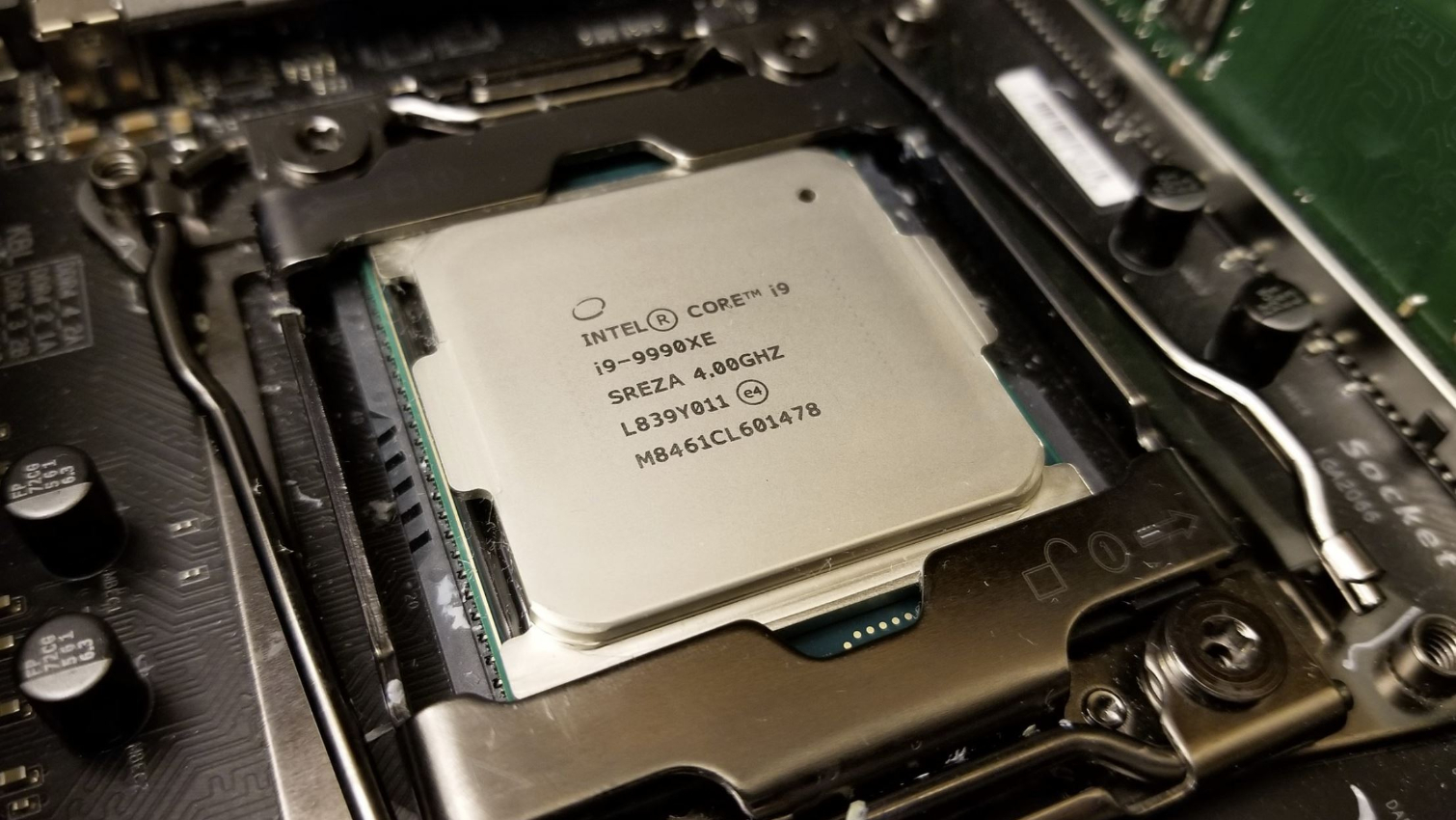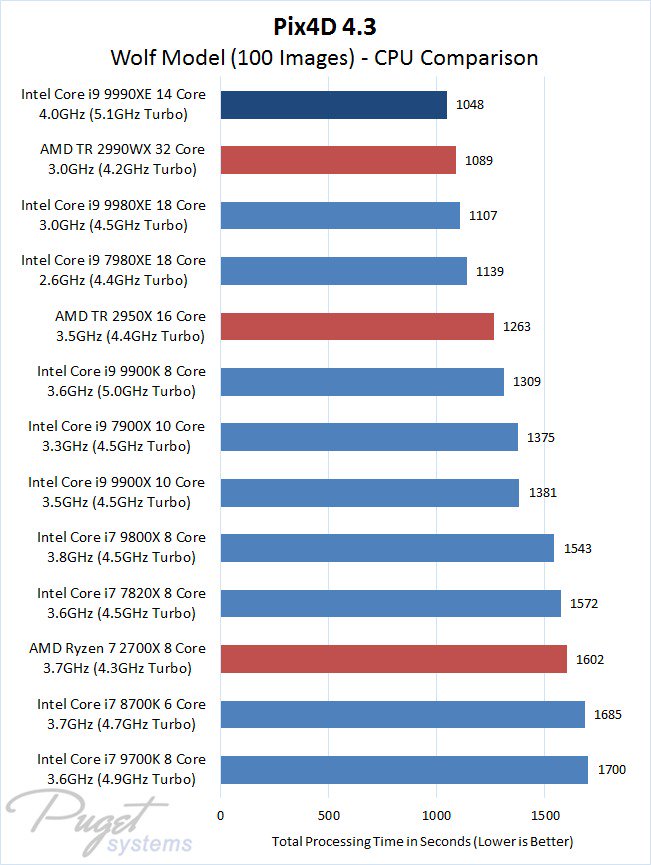Intel's 14-Core i9-9990XE Auctioned for $2,300, More Benchmarks Posted
Courtesy of Puget Systems, we're slowly learning more about Intel's 14-core Core i9-9990XE. This new processor is certainly a rare breed of the company's highest performing silicon, but it doesn't even have a publicly listed product sheet. That's because Intel has only made the processor available to key OEMs in a secret online auction, with the prize chips going to the highest bidder.
That means the only way for enthusiasts to get their hands on the chips is by purchasing a full system, but according to new information, it doesn't seem likely these chips will make their way to mainstream buyers in any form.
Luckily, Puget Systems has already posted several reviews of the processor in Adobe Applications, and now has shared more data on pricing, along with performance in several standard benchmarks, like Cinebench.
| Row 0 - Cell 0 | Cores /Threads | Base / Boost (GHz) | L3 Cache (MB) | PCIe 3.0 | DRAM | TDP | MSRP/RCP | Price Per Core |
| Core i9-9990XE | 14 / 28 | 4.0 / 5.1 | 19.25 | 44 | Quad DDR4-2666 | 255W | $2,300 (Auction) | $164 |
| Core i9-9980XE | 18 / 36 | 3.0 / 4.5 | 24.75 | 44 | Quad DDR4-2666 | 165W | $1979 | $110 |
| Core i9-9940X | 14 / 28 | 3.3 / 4.5 | 19.25 | 44 | Quad DDR4-2666 | 165W | $1387 | $99 |
Intel is selling the chips through a secret quarterly online auction, and Puget System's President Jon Bach tells us that the company secured just one of the chips for testing. The company paid a 15% premium over an 18-core Core i9-9980XE, which works out to ~$2,300. However, the Core i9-9990XE is merely Intel's highest-binned silicon packaged as a high-speed 14-core, making it analogous to the Core i9-9940X that has a $1,400 recommended customer price. That works out to a $900 (64%) premium.
Puget Systems isn't allowed to share further details of the auction, such as when the next one will take place, other winners of the auction, or the number of units sold. We are told, however, that an extremely limited number of processors were sold at auction.
Like the Core i9-9940X, the new chip features 14 cores and 28 threads built on the Skylake microarchitecture. However, while the -9940X features a 3.3 GHz base clock and a 4.5 GHz boost, the -9990XE comes with a 4.0 GHz base, but more importantly, a 5.0 GHz all-core boost that stretches up to 5.1 GHz on two cores.
Those higher clock speeds equate to more performance in some applications, but gains are limited in others. Puget Systems has posted several reviews of performance in various Adobe applications, which we've covered here, and now the company has shared new benchmarks in more common applications.
Get Tom's Hardware's best news and in-depth reviews, straight to your inbox.
Core i9-9990XE Performance
| Benchmark | Core i9-9990XE | Core i9-9940X | Core i9-9800XE | Core i9-9900K |
| Cinebench R15 Multi-Core | 3732 | 3118 | 3760 | 2063 |
| Cinebench R15 Single-Core | 221 | 195 | 199 | 219 |
| V-Ray 1.0.8 CPU | 39 seconds | 43 seconds | 37 seconds | 62 seconds |
| LINPACK | 975 GFLOP/s | 963 GFLOP/s | 1067 GFLOP/s | 443 GFLOP/s |
*Data courtesy of Puget Systems
As we can see in the results above, the Core i9-9990XE handily outstrips its 14-core -9940X counterpart in the full spate of benchmarks, which comes courtesy of its higher clocks that lead to beastly 255W TDP, but those gains might not be acceptable given the processor's high auction price that will ultimately result in a higher price at retail due to the OEM markup. The processor nearly matches the 18-core Core i9-9980XE in multi-threaded Cinebench performance and beats it in the single-threaded test, which is impressive. It also offers much higher performance than the Core i9-9900K across the board.
The chip also performs remarkably well in the LINPACK benchmark. That benchmark uses AVX512 instructions, so applications that support the densely-packed operations would also benefit handsomely from the higher clock speeds.
The company also shared a new benchmark of performance in the Pix4D 4.3 application, showing that the Core i9-9990XE does deliver rather beastly performance in some workloads.
But ultimately Puget Systems has decided not to build systems around the new processor, citing the following reasons:
Availability - We cannot just order more of these from distributors, but have to wait for Intel's auctions to purchase more. Even then, there is no guarantee that we will win any of the bidding... so we cannot forecast availability for our customers.Price - Because of the nature of an auction, we can never be certain of pricing either. The one we won ended up costing about 15% more than a Core i9 9980XE, yet in multi-threaded applications it does not perform all that much faster than the 9980XE.Warranty - The Core i9 9990XE is being sold without any warranty by Intel, and while CPU failure rates are generally low even a single DOA or failure for a customer in the field would be an expensive loss. Further, if a customer has a failure and we are out of stock there is no guarantee we could ever acquire a replacement... especially once Intel stops the auctions for this chip.Heat - This processor uses a lot more power than other Core X models, and this puts out a lot more heat. We've found that the Corsair Hydro H80i cooler with upgraded fans can dissipate the heat well enough for the CPU to operate properly, but long-term there could be unforeseen complications from so much heat. This is especially concerning in tandem with the lack of warranty.
Ultimately the chips' limited availability, hefty pricing, lack of a warranty, and prodigious heat generation have scuttled Puget System's plans to offer systems built around the chip, but we're sure that it will still find plenty of fans in the high frequency trading market for which it was designed.
Given the reasons cited above, it's also unlikely that other system vendors will bring products to the broader market, meaning enthusiasts will find it hard, if not impossible, to score what is likely the ultimate collector's edition chip. In either case, Puget Systems plans to release more benchmark testing with the chip, meaning we can live vicariously through its experiences, if nothing else.
Want to comment on this story? Let us know what you think in the Tom's Hardware Forums.

Paul Alcorn is the Editor-in-Chief for Tom's Hardware US. He also writes news and reviews on CPUs, storage, and enterprise hardware.

